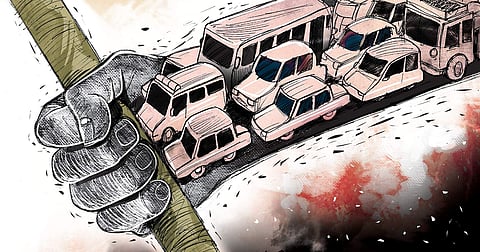

Manoj Das Eminent author and recipient of several awards including the Sahitya Akademi Fellowship Email: prof.manojdas@gmail.com
It was a pleasant drive along a road connecting two distant towns, cutting through unending stretches of green fields overlooking a lake. But I had to stop behind two ordinary buses overloaded with passengers, a bullock cart and a cycle rickshaw.
I got down. There was a “rasta roko”. About a dozen men squatted on the road, flanked by an almost equal number of policemen. Both the parties looked absolutely relaxed.
I talked to the middle-aged captain of the Satyagrahis, seated at the centre in padmasana, and understood that their hamlet, a furlong away, had several problems. Hence their party’s decision for direct action. A summary of the dialogue that followed:
“My friend, why don’t you approach the administration or your MLA?”
“They only promise. This way they will be obliged to act.”
“But how are we responsible? What right have you to block our passage?”
“This road passes by our village, yes, our village. We have the right to block it.”
“Gentleman, would you, if you could, block us from breathing the air because it blows by your village? The road, like the air, is not yours. Please give way.”
“We are agitating non-violently. Your car can roll over us.”
“This is worse than physical violence, moral violence at its worst.”
“I don’t want to argue with you!” He threw away his bidi with impressive force. He was angry. I understood that the collective ego was at work through him. I retreated.
It was a breezeless noon, the summer sun at its hottest. Inside the buses the folks, mostly villagers, were sweating profusely and cursing their luck. A man was rebuking his wife because she had not carried water for their thirsty wailing baby. There was no source of water within sight.
My attention went over to the distressing sight in the rickshaw. An octogenarian woman sat in it supporting a rustic girl, pregnant. The rickshaw-puller informed me that she belonged to his village and was in pain and he volunteered to take her to a health centre still a mile away. She was probably in a swoon. “I wonder if I will be able to ...”
He wiped his face with the end of his tattered shirt.
I dared to present myself before the leader again and appealed to him to let that solitary vehicle pass. He cast a solemn look at me. “How do you expect me to be partial?” he demanded. I realised that he was inspired by new ideals of democracy and equality.
“Look here, gentleman, she could die!”
Instantly he looked upward, simultaneously raising his arms. I realised that he was now inspired by the ancient ideal of karma or destiny. I realised also a greater truth: We are passing through a time when we must accommodate in our codes of conduct laws and ideals of several planes.
Once I had the occasion to witness an Express train detained by a crowd. I can never forget those hundred faces at the doors and windows—seething in despair and anxiety. Some had cases in the court, some had to appear in interviews, some had grave problems at home requiring their immediate presence. A train was the symbol of the nation—it carried together men and women of all religious and political faiths, people from so many regions and strata of the society. A group of people stopping it meant holding the nation to ransom. I also remember the horrendous sign of triumph on the faces of the leaders —atavistic return of a primeval pride of vanquishing an enemy —now an assortment of humanity caught unawares.
The absolutely innocent mocking bird used to be interpreted as teasing others by mimicking their voices and killed. In those hapless passengers I saw flocks of mocking birds unable to comprehend any sense behind their punishment. Over the decades we have killed millions of mocking birds. Are we to believe that the leaders cannot understand the cruelty beneath a rail roko, the stark reality that they were depriving thousands of their freedom by perverting their own freedom to license? Are they really not possessed by some spooks? Only once a gentleman-chief minister had the audacity to declare such actions deplorable, but he denied it a day after under his party’s insistence.
It so happened that I knew one of the leaders, say Shiman-ji, who often swore by Ambedkar. During a chance meeting I asked him if Baba Saheb would have approved of his rail roko, for the latter believed that in independent India all grievances must be addressed legally and constitutionally. “Well, well …” Shriman-ji generously smiled and nodded.
Does nemesis really work? Now that Shriman-ji is no more and readers cannot identify him, I can refer to his tragedy. Life in a major city was once half-paralysed by a bandh called by a party. Shriman-ji’s party announced that it will demonstrate what real bandh is and it indeed fully paralysed life in the city the next week. Shriman-ji was taking lead in one area, haranguing crowds non-stop. At the end of the day it came to light that his grandson, suddenly taken ill, failed to reach the hospital as their car was attacked and detained on its way for hours. The boy died. It reminds us of Arthur Miller’s play, “All My Sons”. The main character knowingly passed on defective engine parts for the Air Force planes and lost his pilot son in a crash that was inevitable.
The Buddha announced that he will not embrace Nirvana until the last man, disillusioned with life, had embraced it. He did not foresee the population explosion. We hope, God does not decide that each compatriot of Shriman-ji must go through similar experiences, in this life or hereafter, to be disillusioned with such activities. Let’s hope God has some other strategy for the future of mankind.